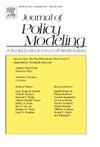Alcohol consumption response to pandemic induced income shocks in India
IF 3.1
2区 经济学
Q1 ECONOMICS
引用次数: 0
Abstract
The study assesses the impact of the Covid-19 pandemic on household consumption of alcohol in India, considering both income shocks and supply-side factors. based on a nationally representative household survey conducted by CMIE. Using a 2SLS panel regression model and employing an approach akin to difference-in-differences technique, our study finds that the pandemic induced lockdowns resulted in a sharp increase in the share of alcohol in total expenditure across rural and urban India, and for all income levels. Alcohol consumption varies by education level, by caste, religion, and severity of income shocks. The increased alcohol consumption during the pandemic, and more so among the households that faced a severe income shock, despite the supply restrictions, suggest the stronger impact of stress-response-dampening hypothesis and self-medication hypothesis compared to the income effect. Despite state-imposed supply restrictions, including temporary alcohol shop closures and subsequent reopening with higher taxes, the study raises concerns about a disproportionate rise in alcohol consumption among the most economically impacted. This underscores the need for balanced policy responses, considering both economic stressors and public health imperatives, and emphasizes targeted interventions to mitigate the consequences of increased alcohol consumption during crises.
酒精消费对流行病引起的印度收入冲击的反应
该研究评估了2019冠状病毒病大流行对印度家庭酒精消费的影响,同时考虑了收入冲击和供给侧因素。基于CMIE在全国进行的具有代表性的住户调查。使用2SLS面板回归模型并采用类似于差异中差异技术的方法,我们的研究发现,大流行导致的封锁导致酒精在印度农村和城市以及所有收入水平的总支出中的份额急剧增加。饮酒量因教育程度、种姓、宗教和收入冲击的严重程度而异。大流行期间酒精消费量的增加,以及尽管有供应限制,但面临严重收入冲击的家庭的酒精消费量增加,表明与收入效应相比,压力反应抑制假说和自我药物治疗假说的影响更大。尽管国家实施了供应限制,包括暂时关闭酒类商店,随后重新开业并征收更高的税,但该研究仍引起了人们对受经济影响最大的酒类消费不成比例增长的担忧。这突出表明需要采取平衡的政策应对措施,同时考虑到经济压力因素和公共卫生需求,并强调有针对性的干预措施,以减轻危机期间酒精消费增加的后果。
本文章由计算机程序翻译,如有差异,请以英文原文为准。
求助全文
约1分钟内获得全文
求助全文
来源期刊

Journal of Policy Modeling
ECONOMICS-
CiteScore
6.20
自引率
11.40%
发文量
76
期刊介绍:
The Journal of Policy Modeling is published by Elsevier for the Society for Policy Modeling to provide a forum for analysis and debate concerning international policy issues. The journal addresses questions of critical import to the world community as a whole, and it focuses upon the economic, social, and political interdependencies between national and regional systems. This implies concern with international policies for the promotion of a better life for all human beings and, therefore, concentrates on improved methodological underpinnings for dealing with these problems.
 求助内容:
求助内容: 应助结果提醒方式:
应助结果提醒方式:


